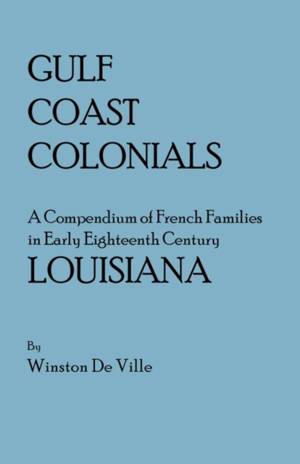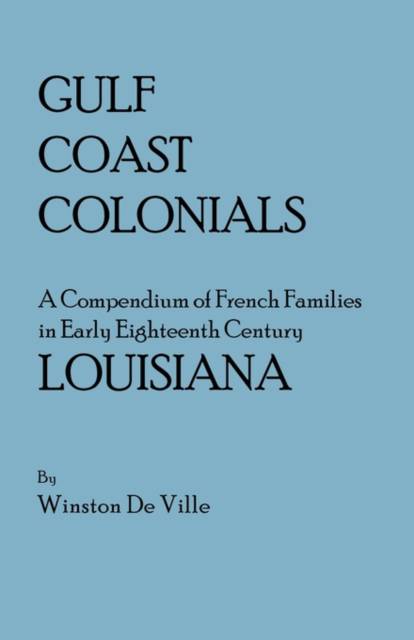
Bedankt voor het vertrouwen het afgelopen jaar! Om jou te bedanken bieden we GRATIS verzending (in België) aan op alles gedurende de hele maand januari.
- Afhalen na 1 uur in een winkel met voorraad
- In januari gratis thuislevering in België
- Ruim aanbod met 7 miljoen producten
Bedankt voor het vertrouwen het afgelopen jaar! Om jou te bedanken bieden we GRATIS verzending (in België) aan op alles gedurende de hele maand januari.
- Afhalen na 1 uur in een winkel met voorraad
- In januari gratis thuislevering in België
- Ruim aanbod met 7 miljoen producten
Zoeken
Gulf Coast Colonials. a Compendium of French Families in Early Eighteenth Century Louisiana
Winston De Ville
Paperback | Engels
€ 25,95
+ 51 punten
Omschrijving
Compiled by an authority on Gulf Coast and lower Mississippi Valley genealogy and history, this work contains published vital records--births, baptisms, marriages, and deaths--pertaining to the inhabitants of the French parish of Mobile during the first half of the eighteenth century. The records, which were kept by the parish priest, are arranged here in alphabetical order by family group, usually headed by the father, followed by the spouse and then the children, who are listed in relative order of birth. The surname of each spouse, furthermore, can be found in the index at the back of the volume. Since Mobile was a frontier outpost of the French empire in North America, most of these records pertain to officers and enlisted men who served in Louisiana and Alabama. Other occupations referred to include merchants, clergy, trappers, artisans, small farmers, clerks, and slaves. While almost all of the entries provide the individual's date of birth, marriage, death or baptism, a number of them also furnish the individual's place of birth in Europe, thereby affording the researcher the opportunity to extend his investigations beyond the immigrant ancestor. In all more than 400 households and 1,000 Gulf Coast colonials are identified by Mr. DeVille.
Specificaties
Betrokkenen
- Auteur(s):
- Uitgeverij:
Inhoud
- Aantal bladzijden:
- 70
- Taal:
- Engels
Eigenschappen
- Productcode (EAN):
- 9780806300931
- Verschijningsdatum:
- 17/05/2010
- Uitvoering:
- Paperback
- Formaat:
- Trade paperback (VS)
- Afmetingen:
- 140 mm x 216 mm
- Gewicht:
- 90 g

Alleen bij Standaard Boekhandel
+ 51 punten op je klantenkaart van Standaard Boekhandel
Beoordelingen
We publiceren alleen reviews die voldoen aan de voorwaarden voor reviews. Bekijk onze voorwaarden voor reviews.









